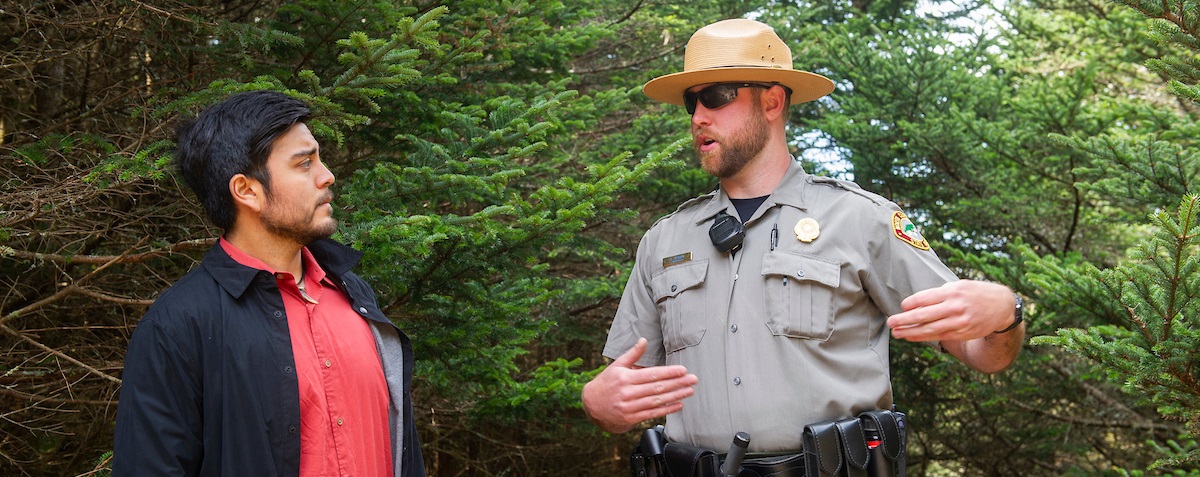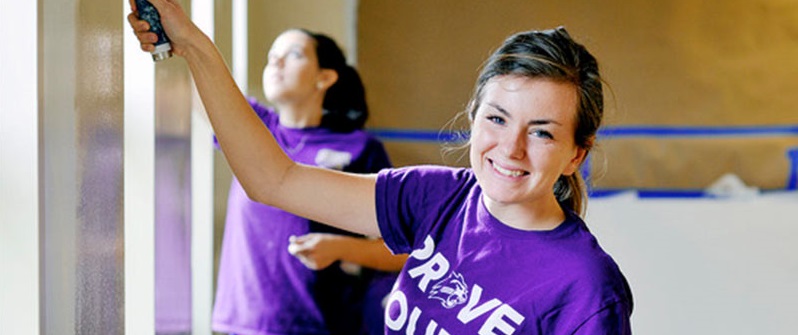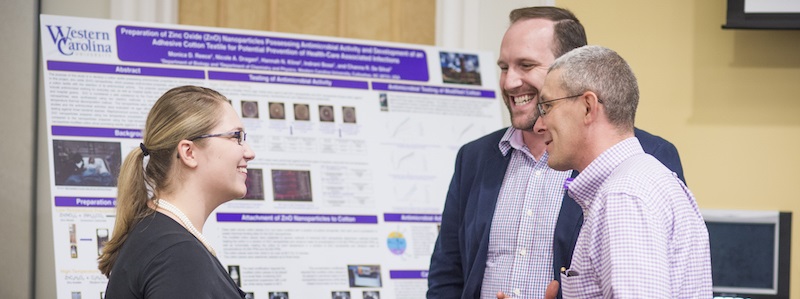- Academic Programs & Support
- Academic Success
- High Impact Practices
High Impact Practices (HIPs)

High Impact Practices are defined by the Association of American Colleges & Universities as teaching and learning practices that have been "widely tested and [...] shown to be beneficial for college students from many backgrounds, especially historically underserved students, who often do not have equitable access to high-impact learning."
At WCU, High Impact Practices are quickly becoming a major focus in all colleges, as we seek to provide the very best experiential and classroom learning opportunities for our students. Below is information about several high-impact practices and how to get involved at Western Carolina University.

What is Study Abroad?
Studying abroad means that you take classes at a university in another country and the credits transfer back to your degree at WCU. Before going abroad you will work with your academic advisor and department head to find courses that are the best match for equivalent course requirements here. Study abroad also encompasses WCU faculty-led courses. These are WCU courses for WCU students led by WCU professors somewhere else in the world.
Who is Study Abroad Best For: Sophomores and Juniors of any major
How Early do I Need to Start Planning: One year prior to the semester you want to be abroad
What is the Cost: Tuition, fees, room and board, flights, travel insurance, and miscellaneous costs
Is There Financial Assistance: Yes, WCU can find a program to fit almost any budget
Where Can I Go: To scores of universities in over 60 countries!
Why is it Important?
- Employers increasingly value graduates with international experiences and education.
- It helps you learn new langugages and appreciate cultures.
- Develop self-confidence while navigating the challenges of living in another country.
- Helps you get introduced to diverse peers and perspectives.
- Allows you travel internationally, by visiting other nearby countries.
How Do I Get Involved?
- Read about different study abroad options and the FAQs on the WCU Study Abroad website.
- Schedule a meeting to discuss your options with a Study Abroad Advisor
WCU Global

What Are Internships?
Internships are short-term, supervised, work experiences that can be either paid or unpaid. These work experiences are tailored to students and individuals looking to grow in a particular field of interest. The difference between an internship and a part-time job or volunteer experience is that internships must include some sort of learning component, such as training or job shadowing, whereas this is not necessary for the other two experiences. Internships are a great way to build your resume and they can be done for class credit or to gain knowledge of and experience in a new field.
Internships For Credit
What are internships "for credit": A class that you take with your internship that you can receive 1-12 credits in
your major! (most are 3 credits)
Who are they best for: Sophomores, Juniors, and Seniors in all majors.
How Early do I Need to Plan: A full semester before you plan to intern.
Do I Need to Find My Own Internship: Yes, but the Career Center can help.
Can the Internship be Paid or Unpaid: It can be either, depending on your major.
Internships Not-For-Credit
What are internships "not for credit": These are internships for experience to help you develop skills and expertise in
your field.
Who are they best for: First-Year through Seniors in all majors.
How Early do I Need to Plan: A full semester before you plan to intern.
Do I Need to Find My Own Internship: Yes, but the Career Center can help.
Can the Internship be Paid or Unpaid: It can be either, depending on your major.
Why is it Important?
- More and more, employers are looking for experience, even in entry-level jobs.
- Employers are more willing and interested in hiring students who complete an intenrship.
- Interning with an organization is an excellent way to make valuable contacts for future opportunities.
- You may be paid more in your starting salary for your first job if you have an intenrship on your resume.
- It is an opportunity to gain skills you can market on your resume and in interviews.
- You can confirm your career goals, or even change them completely.
How Do I Get Involved?
- Read about the different internship opportunities on the WCU Internships website.
- Send an email to the Career Center letting them know you are interested in information on a "for-credit" or "not-for-credit" internship and which semester you are interested in.
Career Center

What Is Service-Learning and Community Engagement?
Service-Learning
Service-learning courses are a great way to gain experience working with regional partners to address community issues. Service-learning courses are offered within your major and include community-based experiences, academic instruction, and structured reflection. While the emphasis and intensity put on each of these three components may vary from course to course, each component is incorporated in order to have a Service Learning Course (SLC) Designation.
How Do I Find Service-Learning Courses: To search for a service-learning course just type "SLC" into the keyword search
bar when looking for courses.
Who are they best for: All students in all majors.
How Early do I Need to Plan: Talk with your advisor the semester before you take the class.
Why Would I Want to Take an SLC course: Service-Learning courses help you 1.) develop workplace skills and personal development
2.) promote equity and foster appreciation for cultural diversity 3.) provide credit
for community engagement
Community Engagement
Community Engagement activities are ways in which students can give back to their community. These can include desiging your own volunteer project, getting involved in a Day of Service, or traveling to a new city while serving the community during an Alternative Break Trip.
What kind of commitment does it take: You can join for a one-day event as a "Day of Service," participate in a week-long
event over Fall and Spring break, or join a more organized group like the Student
Democracy Coalition.
Who are they best for: All students in all majors.
Why is it Important?
- Brings you closer to community partners while learning more about the challenges facing our society.
- Develop oganizational, interpersonal, and teamwork skills.
- Identify areas you are passionate about.
- Helps you connect to others and make new friends.
- Develop career-related skills that make you a more competitive candidate.
How Do I Get Involved?
- Read about the different opportunities on the Center for Community Engagement & Service Learning website.
Comm. Engagement & Service Learning

What is Undergraduate Research?
As undergraduates, students work closely with research and creative teams that are led by our faculty. These faculty are experts in their field and guide students through the research and creative inquiry process. Participating in undergraduate research can prepare you for post-graduation plans by expanding your academic experience and giving you the opportunity to explore an academic discipline more fully. Undergraduate students engaged in research and creative inquiry are making contributions in every department and college on Western's campus.
Who is Undergraduate Research best for: All students in All Majors
How early do I need to start planning: One semester before you want to start your research
Do I need to have my own research project: No! You can join a research team to investigate a project that a WCU Faculty member
is working on. You can also work on your own project with Faculty guidance.
Is there funding to support my research: Yes! You can receive grants to support your research and your travel related to
research from WCU and outside organizations.
Why is it Important?
- Students involved in undergraduate research are more likely to move into graduate programs.
- Undergraduate researchers demonstrate higher academic achievement and are more likely to stay in school.
- Can help you clarify your choice of degree program, career interests, and post-graduation plans.
- Strengthens written and oral communication, crital thinking, technical skills, and information literacy.
- Provides opportunities to build a learning commuity with faculty and fellow students.
- Builds confidence in your abilities within the discipline, and improves your overall perception of the discipline.
How Do I Get Involved?
Want to learn more about becoming an undergraduate researcher? Not sure how to find a faculty member to work with on a research project? Nervous about contacting a faculty member about research? Confused about which programs you qualify for to support your research experience? Getting started can be overwhelming, but we are here to help!
- Take time to outline what you'd like to investigate and/or the discipline you'd want to explore more fully.
- Explore which faculty currently teach and/or conduct research related to the topics you outlined.
- Reach out to the faculty you feel match most with your research interests (send an email to make an appointment or drop in during their office hours)
- Be prepared! Bring your resume or a list of interests, skills, and your semester schedule to discuss how you migth join the faculty research team.
- For more guided support in getting started, make an appointment with the Coordinator for Undergraduate Research.
Undergraduate Research

Capstone Courses & Projects
Whether they’re called “senior capstones” or some other name, these culminating experiences require students nearing the end of their college years to create a project of some sort that integrates and applies what they’ve learned. The project might be a research paper, a performance, a portfolio of “best work,” or an exhibit of artwork. Capstones are offered both in departmental programs and, increasingly, in general education as well.
Collaborative Assignments & Projects
Collaborative learning combines two key goals: learning to work and solve problems in the company of others and sharpening one’s own understanding by listening seriously to the insights of others, especially those with different backgrounds and life experiences. Approaches range from study groups within a course, to team-based assignments and writing, to cooperative projects and research.
Common Intellectual Experiences
Common Intellectual Experiences include opportunities for students to explore and engage in learning about a central topic across the university. At Western Carolina University this is accomplished through the use of a campus theme, a common reader as part of our OneBook program, and signature campus events throughout the academic year.
First-Year Seminars and Experiences
Many institutions now build into the curriculum first-year seminars or other programs that bring small groups of students together with faculty or staff on a regular basis. The highest-quality first-year experiences place a strong emphasis on critical inquiry, frequent writing, information literacy, collaborative learning, and other skills that develop students’ intellectual and practical competencies. First-year seminars can also involve students with cutting-edge questions in scholarship and with faculty members’ own research.
Learning Communities
The key goals for learning communities are to encourage integration of learning across courses and to involve students with “big questions” that matter beyond the classroom. Students take two or more linked courses as a group and work closely with one another and with their professors. Many learning communities explore a common topic and/or common readings through the lenses of different disciplines.
